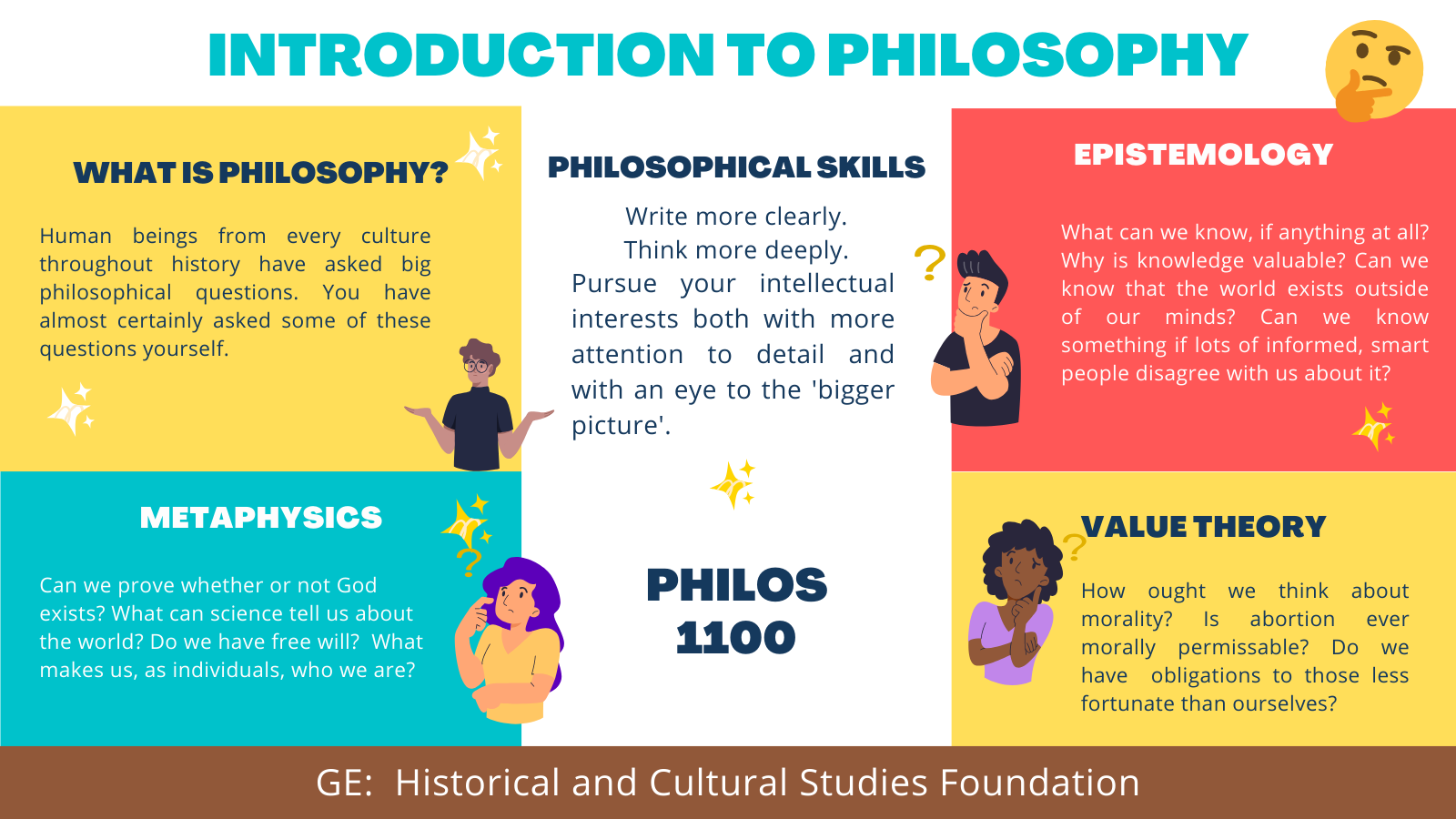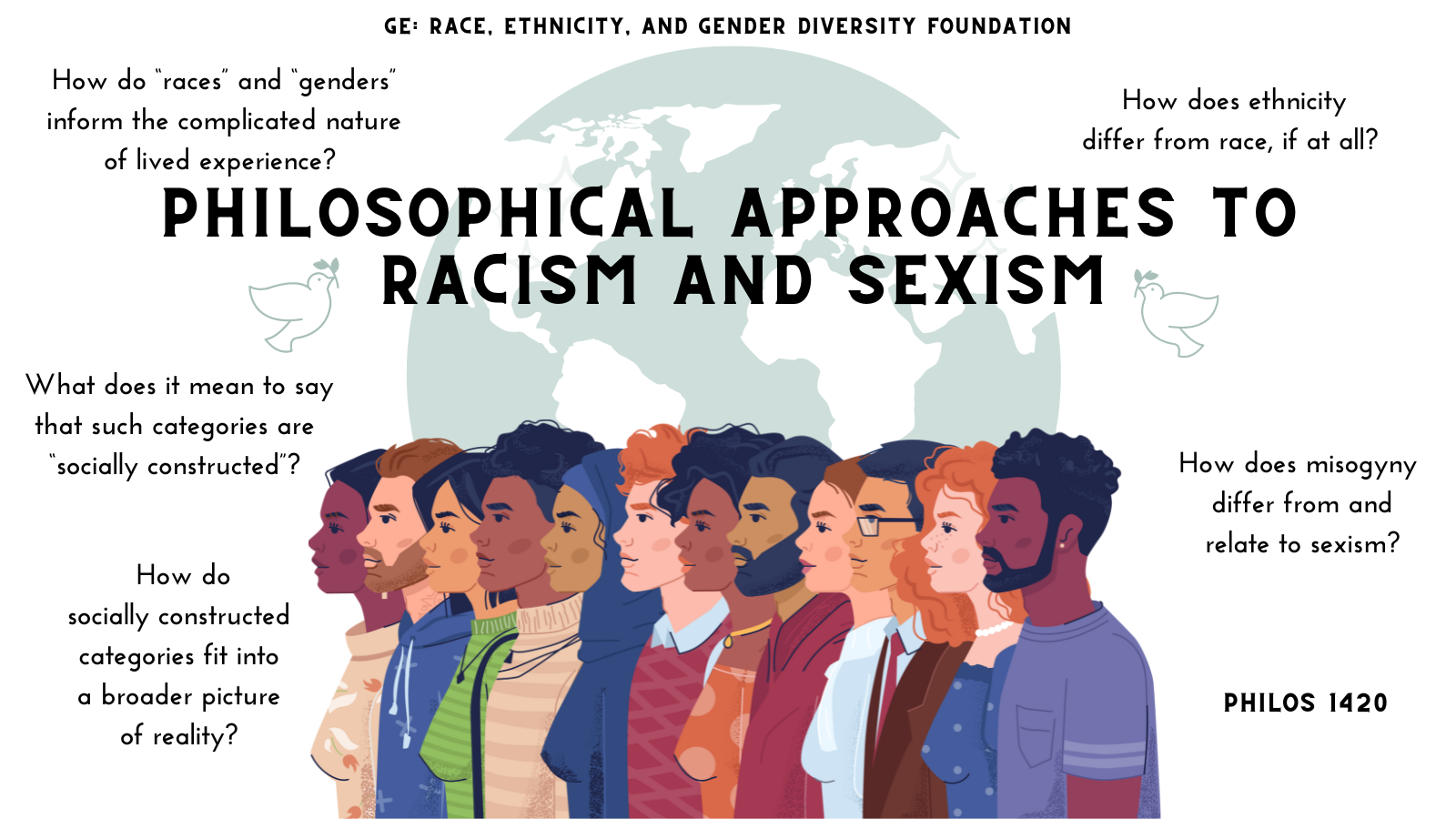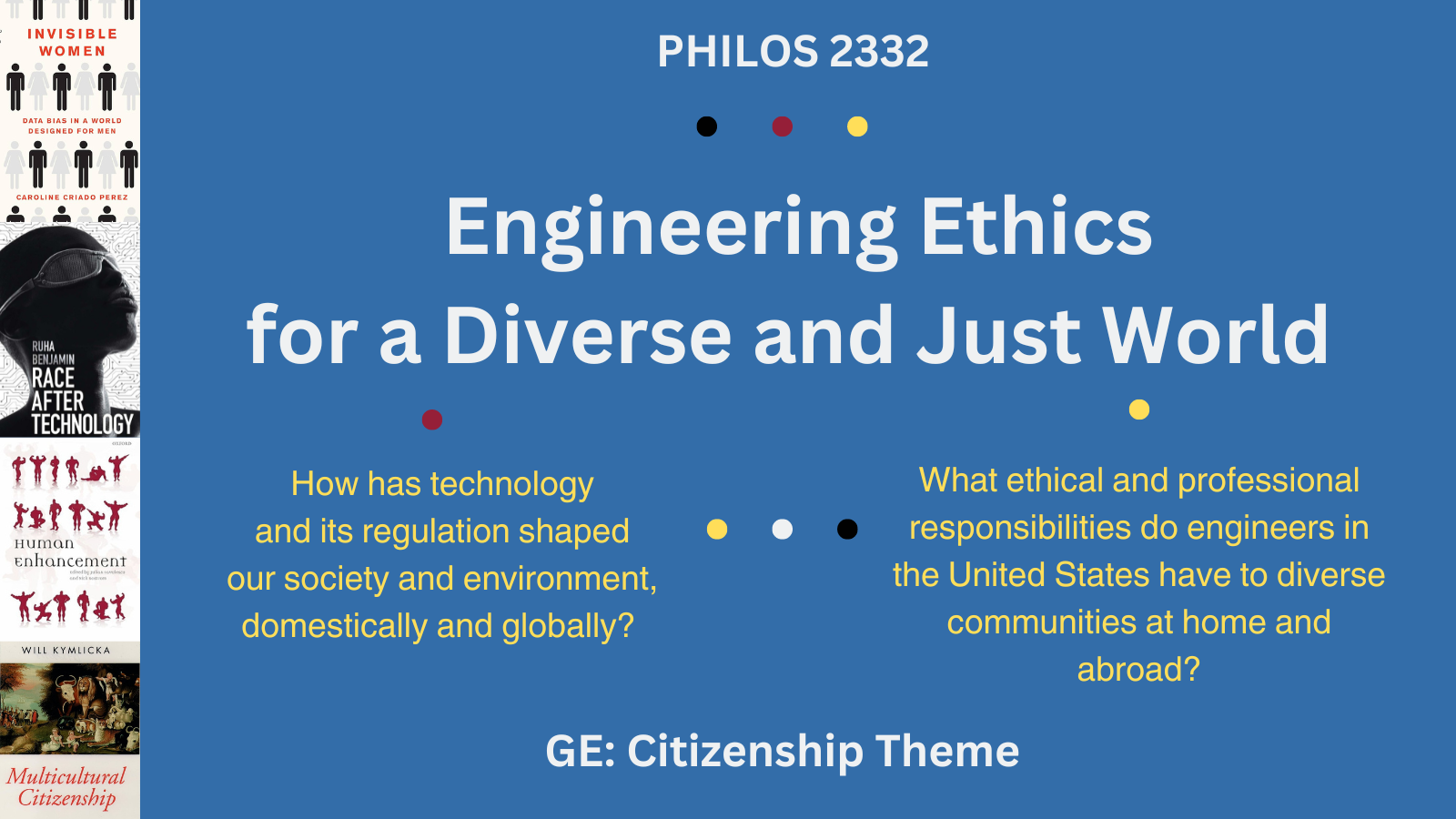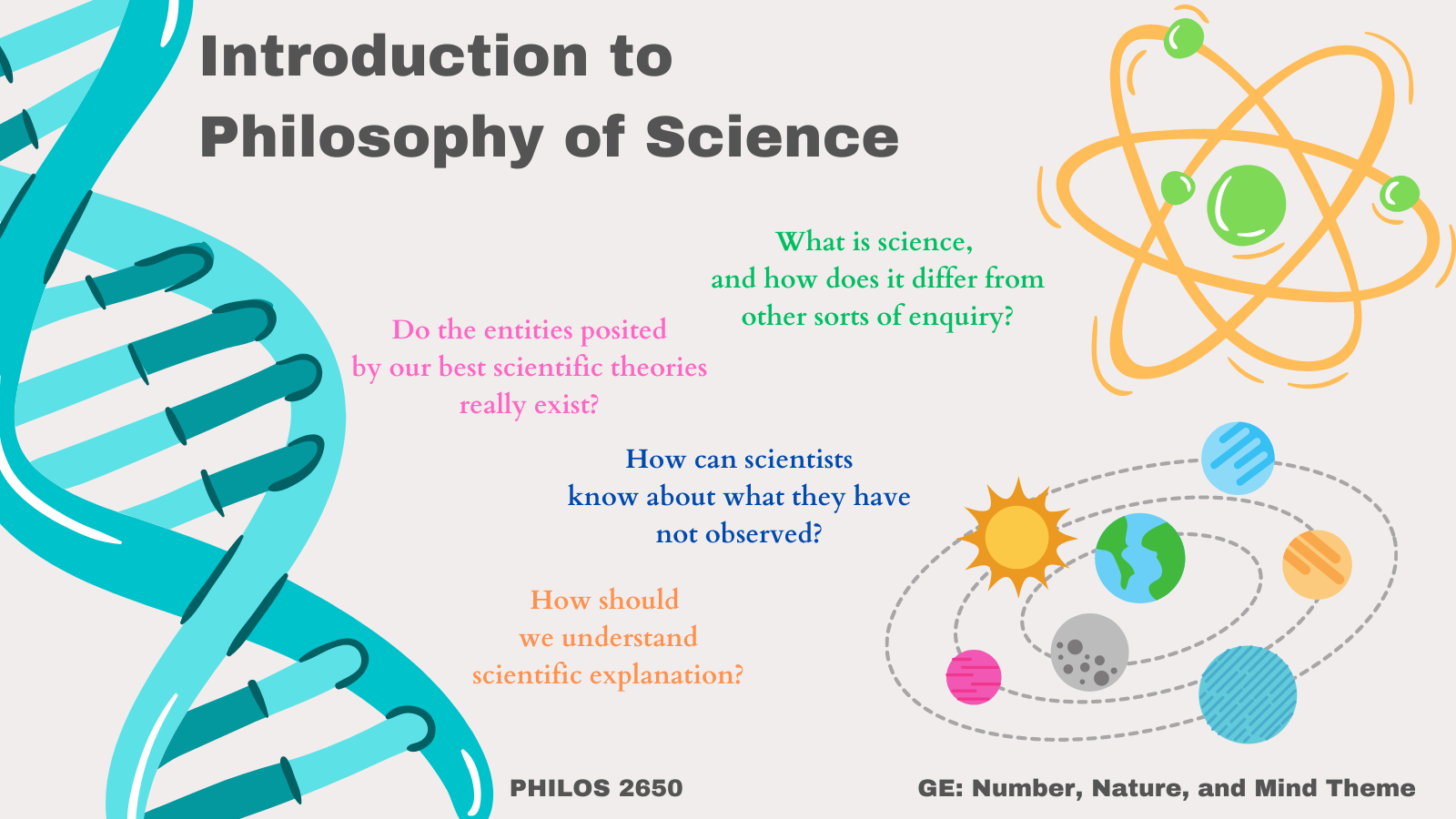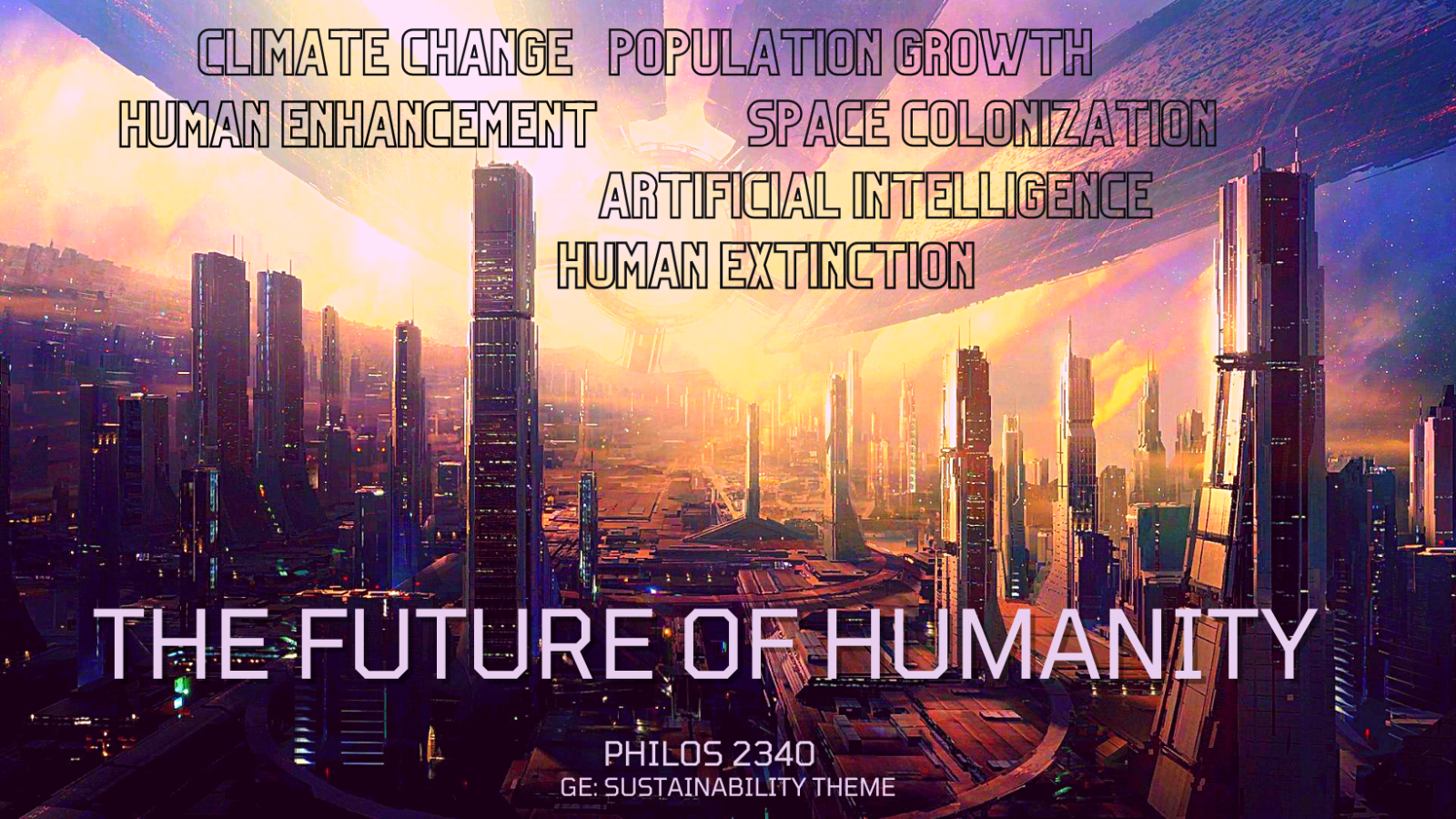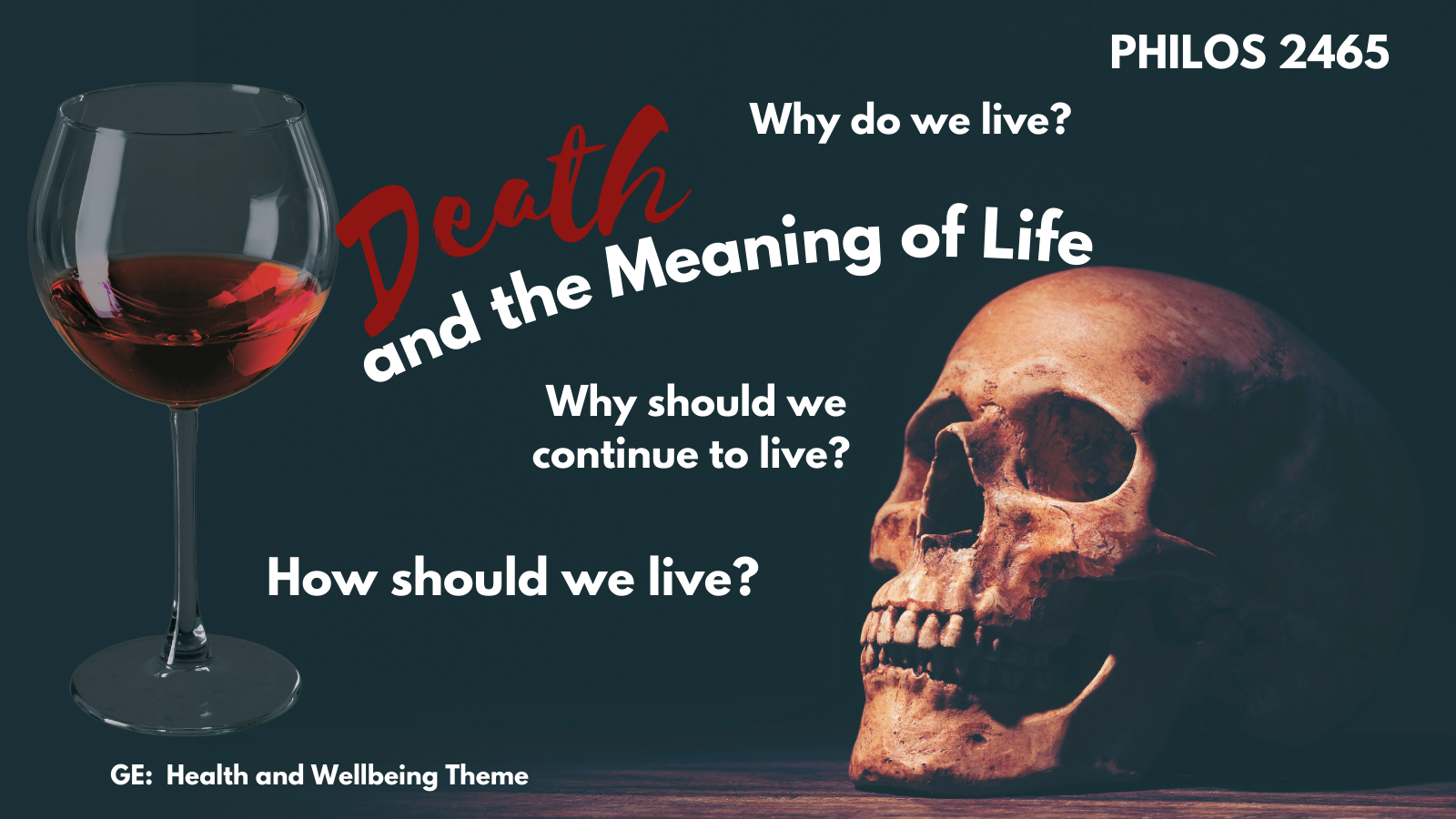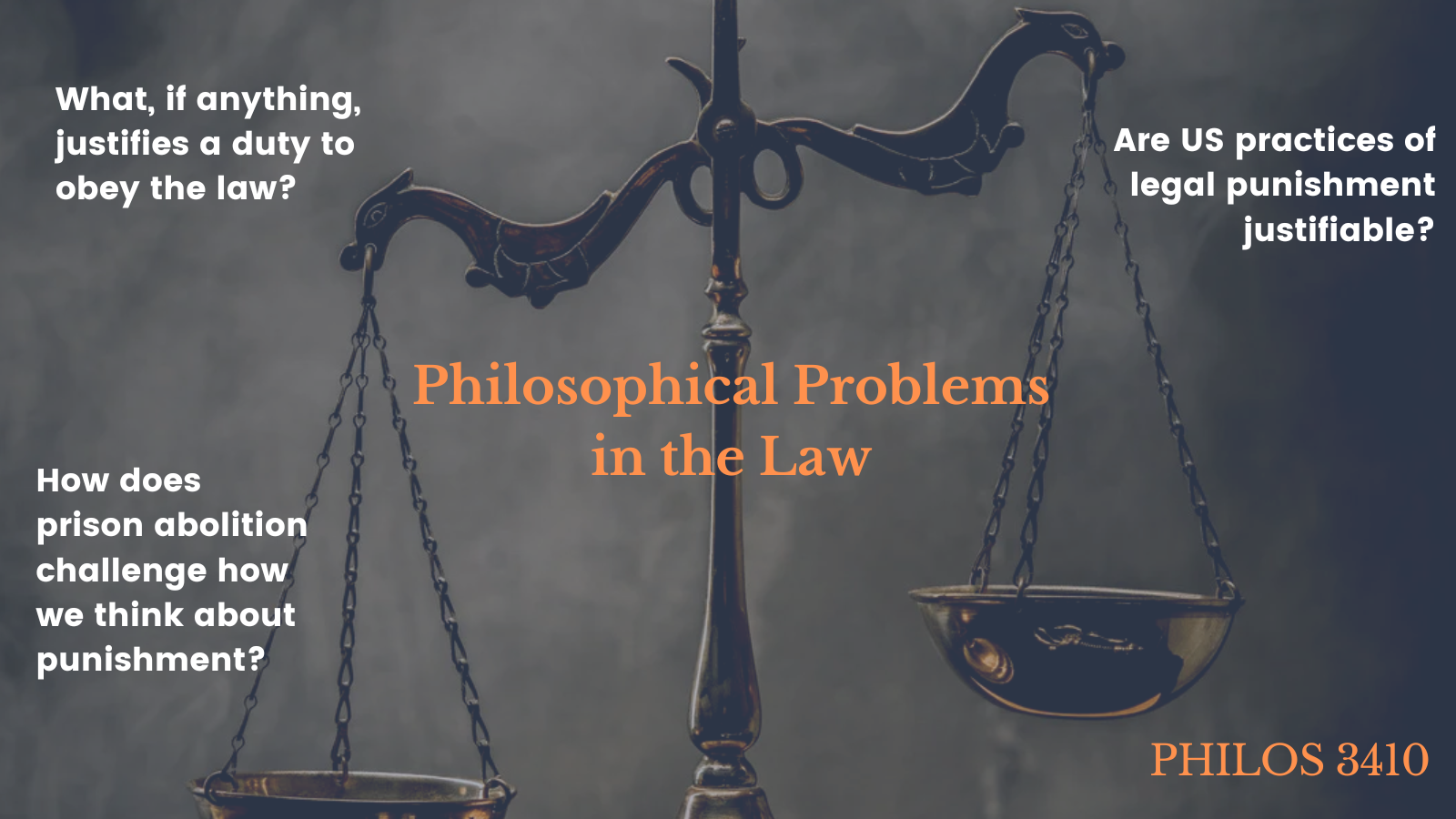Undergraduate Courses
Below is a list of upcoming undergraduate courses with full descriptions (when available) and other specific information. For a full listing of undergraduate-level courses offered by the Department, please see the course catalog. For a complete listing of courses offered in the current and upcoming semester see the schedule of classes.
Please note the following regularities as you plan for upcoming semesters, but be aware that there will be exceptions in some semesters. Please contact the Director of Undergraduate Studies or the Academic Advisor for Philosophy for help planning your Major or Minor in Philosophy.
- Every Fall and Spring semester we typically offer 1100, 2120, 2450, 2465 and 2500, as well as a wide variety of other elective courses at the introductory level.
- Every Fall and Spring semester we offer 3000, the Gateway Seminar for Majors, as well as at least two courses from each category of courses required for the Major (i.e. at least 2 history of philosophy courses at the 3000 level; at least 2 topics courses at the 3000 level; and at least 2 advanced electives at the 5000 level, in addition to a variety of other electives.)
- Every Summer we offer a variety of courses at the introductory level.
GE Categories
Philosophy Courses in the General Education Program
| Course # and Title | Summer | Autumn | Spring |
| PHILOS 1100: Introduction to Philosophy | X | X | |
| PHILOS 1100H: Honors Introduction to Philosophy | X | X | |
| PHILOS 1300: Introduction to Ethics | X | X | |
| PHILOS 1332: Engineering Ethics | X | X | X |
| PHILOS 2120: Asian Philosophies | X | X | |
| PHILOS 2455: Philosophy and Videogames | X | X | |
| PHILOS 2680: Scientific Controversies | X |
| Course # and Title | Summer | Autumn | Spring |
| PHILOS 1420: Philosophical Approaches to Racism and Sexism | X | X | X |
| Course # and Title | Summer | Autumn | Spring |
| PHILOS 1500: Introduction to Logic | X | X | X |
| PHILOS 1501: Introduction to Logic and Legal Reasoning | X | X | X |
| PHILOS 1520: Probability, Data and Decision-Making | X | ||
| PHILOS 2500: Symbolic Logic | X | X | X |
| Course # and Title | Summer | Autumn | Spring |
| PHILOS 2120: Asian Philosophies |
| X | X |
| PHILOS 2450: Philosophical Problems in the Arts | X | X |
Course # and Title | Summer | Autumn | Spring |
| PHILOS 2367: Contemporary Moral and Social Problems | X | X | X |
| Course # and Title | Summer | Autumn | Spring |
| PHILOS 2332: Engineering Ethics for a Diverse and Just World |
| X | X |
| PHILOS 2338: Computing Ethics for a Just and Diverse World |
| X | X |
| PHILOS 2390: Ethics and Leadership in a Diverse World |
| X | X |
| PHILOS 3440: Theorizing Race |
| X | X |
| Course # and Title | Summer | Autumn | Spring |
| PHILOS 2456: Philosophy of Sport | X | X | X |
| PHILOS 2465: Death and the Meaning of Life | X | X | X |
| Course # and Title | Summer | Autumn | Spring |
| PHILOS 2340: The Future of Humanity |
| X | X |
| PHILOS 2342: Environmental Ethics | X | X |
| Course # and Title | Summer | Autumn | Spring |
| PHILOS 3210: History of Ancient Philosophy |
| X |
| Course # and Title | Summer | Autumn | Spring |
| PHILOS 2650: Introduction to the Philosophy of Science | X | ||
| PHILOS 2660: Metaphysics, Magic and the Scientific Revolution |
| X |
Upcoming Course Offerings
2026 Course Descriptions
Summer Autumn
Summer
1332 Engineering Ethics
Asynchronous Offerings: Session 1 (6 weeks), Session 1 (8 weeks), 12 Week Session
The purpose of this course is to equip engineering students with the skills necessary for resolving moral issues that are likely to arise in professional contexts. The course begins with a brief introduction to ethics and will then turns to contemporary issues in engineering ethics. Students will discuss whistleblowing, conflicts of interest, diversity in the workplace, risk and uncertainty, privacy and surveillance, sustainability, autonomous weapons systems, and the ethics of artificial intelligence.
GE: Historical and Cultural Studies Foundation
1500 Introduction to Logic
Asynchronous Offerings: 12 Week Session, Session 2 (8 weeks)
There are many ways to get others to believe what you say: using statistics selectively, appealing to authority figures, or triggering emotional responses. These approaches can be useful and sometimes necessary. However, they're essentially deceptive - if discovered, your audience will rightfully challenge your methods. Moreover, these tactics fail against those trained to spot them. As speakers, we want to rely on sound reasoning rather than rhetorical tricks. As listeners, we want to be able to distinguish rhetoric from reason. In this course, we'll explore what it takes to reason well and how to distinguish between good and bad arguments.
GE: Mathematical and Quantitative Reasoning (or Data Analysis) Foundation
2340 The Future of Humanity
Asynchronous Offering: 12 Week Session
What will life be like in a hundred, two hundred, or five hundred years? Some believe that further advances in technology will make human life unimaginably joyous and prosperous. Others have a much darker vision of our future—one in which our descendants are left with a depleted planet, and in which they face extinction at the hands of technological forces they cannot control. The future of humanity raises important philosophical and ethical questions. Why should we act more sustainably for the sake of future people? How large should the human population become? Should we use technology to enhance ourselves? Will we someday be able to transcend our physical bodies by uploading ourselves into computers—and if so, would this be a desirable thing to do? How might artificial superintelligence change human life—and could it destroy it?
GE: Sustainability Theme
2390 Ethics and Leadership in a Diverse World
Asynchronous Offering: 12 Week Session
In this course, students examine what is required of leaders who are also citizens in a pluralistic, democratic society. How do difference and disagreement shape leaders’ responsibilities? How do responsibilities differ within their organizations and as democratic citizens navigating broader social, political, legal, and economic challenges? Students will engage with leading scholarship on the justification of authority, democratic citizenship, morally responsible decision-making, and virtue ethics to understand how citizenship in a just and diverse society shapes our ideals and practices of ethical leadership.
GE: Citizenship for a Just and Diverse World Theme
2455 Philosophy and Videogames
Asynchronous Offering: 12 Week Session
This course examines video games from a philosophical perspective. The course explores questions such as: What is a game in the first place? Are video games art and if so, are they a distinct form of art from movies or other visual arts? Are achievements that you are awarded in video games real achievements? Do these achievements have value or are videogames largely a waste of time? Is it ever wrong to perform an action in a video game? Is it wrong for tech companies to develop and market video games that are highly addictive for users? Throughout our course, we will also examine broader philosophical issues that arise in the creation and play of videogames. For example, what can we learn from video games about the nature of personal identity or free will?
GE: Historical and Cultural Studies Foundation; and Literary, Visual and Performing Arts Foundation
2465 Death and the Meaning of Life
Asynchronous Offerings: 12 Week Session, Session 2 (8 weeks)
What is a meaningful life? What role, if any, does the afterlife play in conceptions of meaningfulness? Can things like achievement, happiness, and engaging in valuable projects give meaning to our lives? Would immortality or an extraordinarily long life increase or decrease the likelihood of a meaningful life? The course will explore these and related questions.
GE: Health and Well-Being Theme
2120 Asian Philosophies
Hybrid Offering: Session 2 (8 weeks): M/W 7:00p-8:35p
This class will explore the main philosophical traditions that underlie the cultures of India, China, Japan, and a number of other countries in south and east Asia. Specifically, we will work toward understanding some of the essential texts from Hinduism, Buddhism, Confucianism, Daoism, and others as time permits. However, we will not be approaching these texts merely for their historical value. We will be engaging them as potential sources of wisdom and insight into the nature of the world around us and our place within it.
GE: Literary, Visual & Performing Arts Foundation; and Historical and Cultural Studies Foundation
Autumn
1100 Introduction to Philosophy
1100H Honors Introduction to Philosophy
What is the ultimate nature of right and wrong? Can values be objective? Why is there something rather than nothing? Does God exist? Do we have free will? Does it matter? Does anything matter, really? Believe it or not, these are all serious philosophical questions that have important implications for how we should live our lives. Introduction to Philosophy strives to engage these and other perennial philosophical questions using historical and contemporary sources from around the globe.
GE: Historical and Cultural Studies Foundation
Find course sections and sign up now 1100 and 1100H
1300 Introduction to Ethics
What is the source of morality, and what makes an action right or wrong? Does it depend on God’s commands? Is it relative to the views of an individual or culture? Can we rationally debate moral questions at all, and if so how? Introduction to Ethics introduces students to philosophical approaches to these sorts of broad foundational questions. Then students consider how such approaches are relevant to controversial social questions, such as: What is a person, and how does this bear on AI ethics and the abortion debate? What do we owe to sentient non-human creatures and how does this bear on the ethics of eating animals or keeping them as pets? When and why is punishment justified, and how does this bear on the American penal system? What is the moral justification for national borders, and how does this bear on immigration debates? Students will read selections from a few of the most historically influential philosophers, including Plato, Immanuel Kant, and John Stuart Mill, and many more contemporary thinkers.
GE: Historical and Cultural Studies Foundation
Find course sections and sign up now
1332 Engineering Ethics
The purpose of this course is to equip engineering students with the skills necessary for resolving moral issues that are likely to arise in professional contexts. The course begins with a brief introduction to ethics and will then turns to contemporary issues in engineering ethics. Students will discuss whistleblowing, conflicts of interest, diversity in the workplace, risk and uncertainty, privacy and surveillance, sustainability, autonomous weapons systems, and the ethics of artificial intelligence.
GE: Historical and Cultural Studies Foundation
Prerequisites/Restrictions: Not open to students with credit for 1300
Find course sections and sign up now
1500 Introduction to Logic
There are many ways to get others to believe what you say: using statistics selectively, appealing to authority figures, or triggering emotional responses. These approaches can be useful and sometimes necessary. However, they're essentially deceptive - if discovered, your audience will rightfully challenge your methods. Moreover, these tactics fail against those trained to spot them. As speakers, we want to rely on sound reasoning rather than rhetorical tricks. As listeners, we want to be able to distinguish rhetoric from reason. In this course, we'll explore what it takes to reason well and how to distinguish between good and bad arguments.
GE: Mathematical and Quantitative Reasoning (or Data Analysis) Foundation
Prerequisites/Restrictions: Not open to students with credit for 1501.
Find course sections and sign up now
1501 Introduction to Logic and Legal Reasoning
This course equips students with the tools of logic and critical thinking especially as they apply to the assessment of legal reasoning. By examining court cases and legal materials, students will learn to assess the strength and validity of legal reasoning, and thus to be able to evaluate and weigh legal evidence and testimony to reach justified conclusions. The critical reasoning practiced in the legal context will generalize to other domains.
GE: Mathematical and Quantitative Reasoning (or Data Analysis) Foundation
Prerequisites/Restrictions: Not open to students with credit for 1500.01, 1500.02, or 1501
Find course sections and sign up now
1520 Probability, Data and Decision-Making
When was the last time you took a risk? It’s far more recent than you think. We constantly undertake risks including deciding to drive to work and deciding to go bungee jumping. One of these is a risk we undertake without much hesitation while the other seems to require careful consideration. In this course, we will examine the rational processes by which we make decisions in the face of uncertainty. To cash out this decision theory, we’ll examine (a) what probability is and how it relates to uncertainty, (b) evaluate the data needed to determine the probability of an event, (c) how to weigh the benefits of an outcome against its risks, and (d) how our actions and beliefs ought to be guided by the probabilistic information we gain.
Find course sections and sign up now
2120 Asian Philosophies
This class will explore the main philosophical traditions that underlie the cultures of India, China, Japan, and a number of other countries in south and east Asia. Specifically, we will work toward understanding some of the essential texts from Hinduism, Buddhism, Confucianism, Daoism, and others as time permits. However, we will not be approaching these texts merely for their historical value. We will be engaging them as potential sources of wisdom and insight into the nature of the world around us and our place within it.
GE: Literary, Visual & Performing Arts Foundation; and Historical and Cultural Studies Foundation
Find course sections and sign up now
2332 Engineering Ethics for a Diverse and Just World (with Research Inquiry)
This course provides students in engineering and technology fields analytical and critical tools to help them design and build for a diverse and just world. Codes of ethics—such as the NSPE Code of Ethics for Engineers—encapsulate the demands of citizenship on engineers in their professional capacities. These codes prioritize safety, health, and welfare—but what do these require in a diverse world marked by racial, ethnic, gender, and other inequalities? What ethical and professional responsibilities do engineers in the United States have to diverse communities at home and abroad, and how can they work collaboratively and inclusively?
GE: Citizenship for a Just and Diverse World Theme
Find course sections and sign up now
2338 Computing Ethics for a Just and Diverse World
This course provides students in computer science fields analytical and critical tools to become ethically attuned citizens who promote and sustain justice in a diverse world. Codes of ethics—IEEE Code of Conduct and Code of Ethics, and the ACM Code of Ethics—encapsulate the demands of citizenship on computer scientists in their professional capacities. These codes prioritize safety, health, and welfare—but what do these require in a diverse world marked by racial, ethnic, gender, and other inequalities? What ethical and professional responsibilities do computer scientists have to diverse communities at home and abroad, and how can they work collaboratively and inclusively?
GE: Citizenship for a Just and Diverse World Theme
Find course sections and sign up now
2340 The Future of Humanity
What will life be like in a hundred, two hundred, or five hundred years? Some believe that further advances in technology will make human life unimaginably joyous and prosperous. Others have a much darker vision of our future—one in which our descendants are left with a depleted planet, and in which they face extinction at the hands of technological forces they cannot control. The future of humanity raises important philosophical and ethical questions. Why should we act more sustainably for the sake of future people? How large should the human population become? Should we use technology to enhance ourselves? Will we someday be able to transcend our physical bodies by uploading ourselves into computers—and if so, would this be a desirable thing to do? How might artificial superintelligence change human life—and could it destroy it?
GE: Sustainability Theme
Find course sections and sign up now
2342 Environmental Ethics
This course explores the relationship between humans, our fellow creatures, and the environment we inhabit together. It addresses theoretical questions concerning the value of nature, our duties to future people, environmental justice, and animal rights, as well as practical debates about the ethics of consumption, ecological and animal rights activism, and the just distribution of climate change burdens. By the end of the semester, you will develop the skills needed to think critically about our current environmental challenges and apply ethical reasoning to novel environmental ethics puzzles that will surely emerge over the course of your life.
GE: Sustainability Theme
Find course sections and sign up now
2367 Contemporary Social and Moral Problems in the U.S.
Contemporary U.S. society presents a myriad of social and moral challenges. In this course, students will dissect pressing issues such as the ethics of wealth disparity, racial and gender discrimination, political polarization, and climate change. In this course, students will learn how to analyze, construct, and defend moral arguments with careful reasoning and how to apply these skills to philosophical writing.
GE: Writing and Information Literacy Foundation
Find course sections and sign up now
2390 Ethics and Leadership in a Diverse World
In this course, students examine what is required of leaders who are also citizens in a pluralistic, democratic society. How do difference and disagreement shape leaders’ responsibilities? How do responsibilities differ within their organizations and as democratic citizens navigating broader social, political, legal, and economic challenges? Students will engage with leading scholarship on the justification of authority, democratic citizenship, morally responsible decision-making, and virtue ethics to understand how citizenship in a just and diverse society shapes our ideals and practices of ethical leadership.
GE: Citizenship for a Just and Diverse World Theme
Find course sections and sign up now
2400 Political and Social Philosophy
The course investigates one of the central questions of philosophy: How should we, as human beings, live together? Given that social and political institutions both shape us and are shaped by us, what values should we adopt so that we may best fulfill our natures as individual and social beings? In particular, we will focus on questions surrounding how and whether a state can be justified, what it means to be free, what justice entails, and what equality is for, as well as contemporary issues, such as the protection and violation of human rights, immigration, epistemic injustice, and global poverty.
Find course sections and sign up now
2450 Philosophical Problems in the Arts
What is art? How should we feel about images, music, and video created by artificial intelligence? Is that art too or is it something else entirely? Is artistic value merely subjective or is there some substantial difference between good and bad art? What role does creativity play in the good life and should we keep making art even if we aren't particularly good at it? This class will engage the complex interactions between the history and the philosophy of art as we strive to understand the nature of art itself and why we value it.
GE: Literary, Visual & Performing Arts Foundation
Find course sections and sign up now
2455 Philosophy and Videogames
This course examines video games from a philosophical perspective. The course explores questions such as: What is a game in the first place? Are video games art and if so, are they a distinct form of art from movies or other visual arts? Are achievements that you are awarded in video games real achievements? Do these achievements have value or are videogames largely a waste of time? Is it ever wrong to perform an action in a video game? Is it wrong for tech companies to develop and market video games that are highly addictive for users? Throughout our course, we will also examine broader philosophical issues that arise in the creation and play of videogames. For example, what can we learn from video games about the nature of personal identity or free will?
GE: Historical and Cultural Studies Foundation; and Literary, Visual and Performing Arts Foundation
Find course sections and sign up now
2456 Philosophy of Sport
Sport is a central part of many people's lives, but despite the popularity and ubiquity across cultures and histories, there are still a number of questions about it that we've yet to answer. For instance: What constitutes a sport? How is sport different from games? Are esports even sports? What role does sport have within a happy and flourishing life? How should we understand fairness and cheating? How do these considerations bear on drug use in sport? How do considerations of sex, gender, race, ethnicity, and discrimination intersect with sport? In addressing these questions, the course draws on insights from a wide range of subjects including philosophy, psychology, and exercise science.
GE: Health and Well-Being Theme
Find course sections and sign up now
2465 Death and the Meaning of Life
What is a meaningful life? What role, if any, does the afterlife play in conceptions of meaningfulness? Can things like achievement, happiness, and engaging in valuable projects give meaning to our lives? Would immortality or an extraordinarily long life increase or decrease the likelihood of a meaningful life? The course will explore these and related questions.
GE: Health and Well-Being Theme
Find course sections and sign up now
2500 Symbolic Logic
Ordinary physical objects have a basic structure. Various natural sciences (physics, biology, chemistry, etc.) help us understand this structure, thereby enabling better prediction and control of the world around us.
Analogously: ordinary language and ordinary arguments have a basic structure; part of the role of symbolic logic is to help us understand this structure, thereby facilitating more effective reasoning and argumentation. In this course we develop a theory of valid deducibility adequate to handle most deductive reasoning to be found in science, mathematics, and legal discourse. Along the way we will reflect upon such notions as logical truth, logical form, the nature of language, the relation between truth and derivability, the idea of a “correct logic,” and the very idea of a valid argument. Students should emerge from the course more sensitive to the structure of deductive arguments and better equipped to evaluate them.
The course is self-contained and requires no special background beyond familiarity with the techniques of high school algebra and geometry. There will be three mid-term exams and a cumulative final exam, plus frequent problem sets. TEXT: E.J. Lemmon, Beginning Logic.
GE: Mathematical and Quantitative Reasoning (or Data Analysis) Foundation
Prerequisites/Restrictions: Math 1075 or equiv, or an ACT Math subscore of 22 or higher that is less than 2 years old
Find course sections and sign up now
2540 Introduction to the Philosophy of Rational Choice
This course is a brief introduction to rational choice theory and its philosophical, political, and economic significance. It surveys dominant views of rationality and the normative constrains they impose on actions and decisions including decision and game theories. We will also discuss the relationship between individual rationality and the emergence of norms, conventions, and institutions.
Find course sections and sign up now
2660 Metaphysics, Religion, and Magic in the Scientific Revolution
The seventeenth century saw revolutionary developments in natural science, specifically, in matter theory, mechanics, chemistry, and astronomy. These developments were intertwined with magical traditions, religious doctrines and disputes, and, especially, philosophical theories and arguments. This course will examine some of these connections in the works of some of the most influential natural philosophers of the period. Our main goal is a richer understanding of this crucial period in the development of modern science.
GE: Number, Nature, Mind Theme
Prerequisites/Restrictions: N/A
Find course sections and sign up now
2680 Scientific Controversies
Modern science raises many difficult questions about the nature of the universe and our place in it. This class considers several controversies that arise within science and investigates their broader philosophical significance. How does science work in different domains and at different times, and what can science tell us about ourselves and the nature of the world? This semester we will consider four questions: What is life? Can computers think? What is intelligence? Are there male and female brains? Readings will be drawn from the sciences and the philosophy of science.
Find course sections and sign up now
3000 Gateway Seminar
The Gateway Seminar is designed to introduce new students to the philosophy major. The main aim of the course is to help you develop the intellectual skills you’ll need to succeed in upper-level philosophy courses. As a result, we’ll spend time talking about how to read a philosophy paper, how to write a philosophy paper, how to evaluate arguments, and how to design counterexamples. We’ll develop these skills through an exploration of some central problems in ethics, epistemology, and philosophical methodology.
Find course sections and sign up now
3001 PPE Core I
This course examines three models of human nature, each of which captures something important about social and political life, and each of which has significant blind spots. The first model sees human beings as rational actors who seek to maximize the satisfaction of their preferences. The second model sees human beings as citizens with public responsibilities that orient them toward the pursuit of the common good. The third model sees human beings as members of communities that provide an identity and a set of values that enable them to navigate the social world. We use these models to explore two fundamental social and political questions: first, the question of what makes a society a “good” society, and second, the question of whether and to what extent a good society should rely on individualistic or collective processes – markets or politics – to organize its affairs.
Find course sections and sign up now
3210 Ancient Philosophy
This course entails a study of the major texts in ancient Greek philosophy, including the best and most influential writing by the Presocratics, the Sophists, Plato, and Aristotle. Questions we will ask include, what is the world made of most fundamentally and where did it come from? Is everything in constant flux, or are some things permanent throughout eternity? Is truth something common to everyone, or instead is truth merely "up to the individual?" What is a good human life, and how can we achieve this? Our goal throughout is to understand how and why Western philosophy began and developed as it did, and to recover its valuable early insights, many of which are lost to us in our own day.
Find course sections and sign up now
3300 Moral Philosophy
This course explores ideas and strategies for teaching philosophy, with a special focus on the theory and practice of classroom dialogue facilitation and the Philosophy for Children tradition. You and your fellow classmates will develop skills for fostering caring, creative, and critical thinking through procedurally directive dialogue facilitation techniques, crafting engaging and pedagogically sound lesson plans, and diagnosing and responding to the most difficult classroom puzzles in real time. You will also put what you have learned into practice by teaching lessons at a local high school. This course will critically assess some philosophically influential answers to these questions, and to other, related ones. It will emphasize the development of intellectual skills such as critical reasoning, discussion and focused analytical writing.
Prerequisites/Restrictions: 6 cr hrs of Philos course work, or enrollment in Philosophy, Politics, and Economics Major, or permission of instructor
Find course sections and sign up now
3310 Morality and the Mind
This is a course in moral psychology. We will cover topics such as altruism and egoism, moral motivation, praise and blame, moral responsibility, moral judgments and intuitions, virtue and vice, and character. Through both empirical and theoretical research, we will investigate the psychologies of the virtuous and the psychopath, the strong- and the weak-willed, the rationally- and the emotionally-driven agent. Guiding us in our investigations will be one central question: What can facts about human psychology tell us about human morality?
Prerequisites/Restrictions: 3 cr hrs in Philos, or permission of instructor
Find course sections and sign up now
3341 Ethical Conflicts in Health Care Research, Policy and Practice
The advances made in medicine over the past century are an impressive collective human achievement. However, not all people have benefited equally from the explosive growth of biomedical technology and some have suffered greatly both in the development and the procurement of medical care. This course offers a philosophical approach to analyzing some key moral dilemmas that have arisen in health care research, policy, and practice. Topics that we will cover in the course include the ethics of human and animal research, particularly the means we may take toward laudable ends; the ethics of genetic enhancement and what the ends of medicine should be; philosophical perspectives related to addiction; and the ethics of health care provision and what sort of society we should aspire to be.
Find course sections and sign up now
3410 Philosophical Problems in the Law
This course explores questions about the ontology, meaning, and justice of laws. What distinguishes a law from a mere command? Does an answer to this question depend on whether the commands are moral? What determines a law's meaning: is it the author's intention or is it something else, such as what a law might mean to a competent reader? How ought considerations about race and historical injustice properly figure in legal reasoning? Are such considerations ever permissible in legal reasoning? If not, does legal reasoning perpetuate institutionalized racism?
Prerequisites/Restrictions: Not open to students with credit for 338
Find course sections and sign up now
3420 Philosophical Perspectives on Issues of Gender
“One is not born, but rather becomes a woman”—or so thought Simone de Beauvoir in 1949. This groundbreaking statement is part of an on-going conversation about how and whether gender is related to biological sex, sexuality, class, race, ethnicity, and nation. What does it mean to be a woman or man? Can one be neither? How does gender inform one’s conception of the good, truth, and justice? (How) Can answers to these questions help those who seek to resist and end domination, exploitation, marginalization, powerlessness, imperialism, and/or violence? Where can we find hope and how should we pursue it? This course explores these questions from a broad range of feminist perspectives as well as from ones that are not feminist. This course is offered in coordination with the Ohio Prison Education Exchange Project (OPEEP). The course is a class with both campus students and incarcerated students at the London Correctional Institution, a state prison facility in London, Ohio. The class meets once a week at the prison facility. Students are enrolled only by permission of instructor.
GE: Cultures and ideas and diversity soc div in the US course.
Prerequisites/Restrictions: 3 cr hrs in Philos, or permission of instructor.
Find course sections and sign up now
3440 Theorizing Race
This course will address questions of the following sort: What is race? What conditions in history and society give rise to race—as acceptable definition and categorization of (human) identity? When, where, and why does race come to be in the world? Of what use, and for what purpose, is race? What are the consequences of race—i.e., the lived experiences and conditions that race gives rise to? This course will acquaint students with knowledge of the relations between different social and global groups—as found in America and elsewhere, and the manner in which these social and global relations of race have been shaped by power and knowledge. Additionally, students will learn about the bases and the terms in which, in the modern world, identities, cultures, and communities—and their ideologies—are formed.
Find course sections and sign up now
3530 Philosophy of Logic
Ever wondered how "chicken scratch" (logical syntax) came to be? Having problems getting a deeper understanding of those logical concepts that passed you by like ships in the night in 2500? Quaking in your boots at the prospect of having to take 5500 without any sense of why it's philosophically important? Then 3530 is the course for you! In it we shall examine, in more philosophical vein, all the main concepts in and about Logic. This will deepen your mastery of the technical material in 2500 and give meaning and purpose to the more formidable technicalities that await you in 5500.
Find course sections and sign up now
3700 Introduction to Metaphysics
The world is complex and mysterious. We will examine various metaphysical assumptions: that reality contains spiritual as well as physical entities; that consciousness is not a physical phenomenon; that there exist necessities in nature; that there exist abstract objects knowable through reason alone; that moral and aesthetic properties, like physical properties, are real; that finite beings can have knowledge of the world as it is in itself. Efforts will be made to clarify our concepts of possibility, necessity, causation, persistence, metaphysical dependency, identity, and mind-dependence.
Find course sections and sign up now
3800 Introduction to Philosophy of Mind
Over the last few decades, the philosophy of mind has become a central subfield of philosophy. The aim of this course is to provide a survey of the major themes, theories and issues that have dominated this subfield. Specifically, we will focus on three fundamental issues: the traditional mind-body problem (roughly, how mental and physical phenomena are related to each other); the problem of consciousness (roughly, what consciousness is and how physical organisms can have conscious experiences); and the problem of intentionality (roughly, how it is possible for our thoughts to represent the world).
Find course sections and sign up now
5260 Seminar in 20th Century Philosophy
This course considers the philosophy of Ludwig Wittgenstein (1889-1951). Although widely regarded as one of the most important thinkers of the twentieth century, there is no consensus on what Wittgenstein thought or why he thought it. In this class we will focus on his two most famous works: the Tractatus Logico-Philosophicus (1921) and the Philosophical Investigations (1953). Throughout Wittgenstein is concerned with the nature of language, mind, logic and the world as a whole, but it is difficult to know what aspects of the earlier work are preserved in the later work. To help figure out why Wittgenstein might have changed his mind on some key philosophical questions, we will supplement our readings with a selection of material that he generated during his “middle” period, from roughly 1930 until 1939. We will try to do justice to Wittgenstein as an essentially dynamic thinker who continually reflected both on the cogency of his philosophical views and the desirability of pursuing philosophical reflection in the first place.
Find course sections and sign up now
5420 Philosophical Topics in Feminist Theory
In this course, we’ll read work from leading feminist philosophers that touch upon the idea of justice. The focus will move beyond the question of distributive justice in ideal circumstances that has organized so much political philosophy in recent decades. Rather they start, as many feminist works do, from the question of injustice: What is it? How is it reinforced by our structures and our relationships? How should we treat each other in the face of systemic and historical injustice? How can we eradicate it? In particular, we will investigate recent feminist conceptions of epistemic injustice, gender injustice, health care injustice, and racial injustice.
Find course sections and sign up now
5800 Advanced Philosophy of Mind
In this course, we will discuss the moral significance of consciousness. Can we have any moral obligations to “Zombies” who lack any capacity for conscious experience? Or to “Vulcans” who are conscious but lack any capacity for pleasure, pain, or affectively valenced experience? To answer these questions, we will examine various theories of wellbeing and moral status in order to assess what kinds of mental capacities you need in order to fall within their purview. In particular, we will examine the nature of desire, pleasure, and pain.
Find course sections and sign up now

